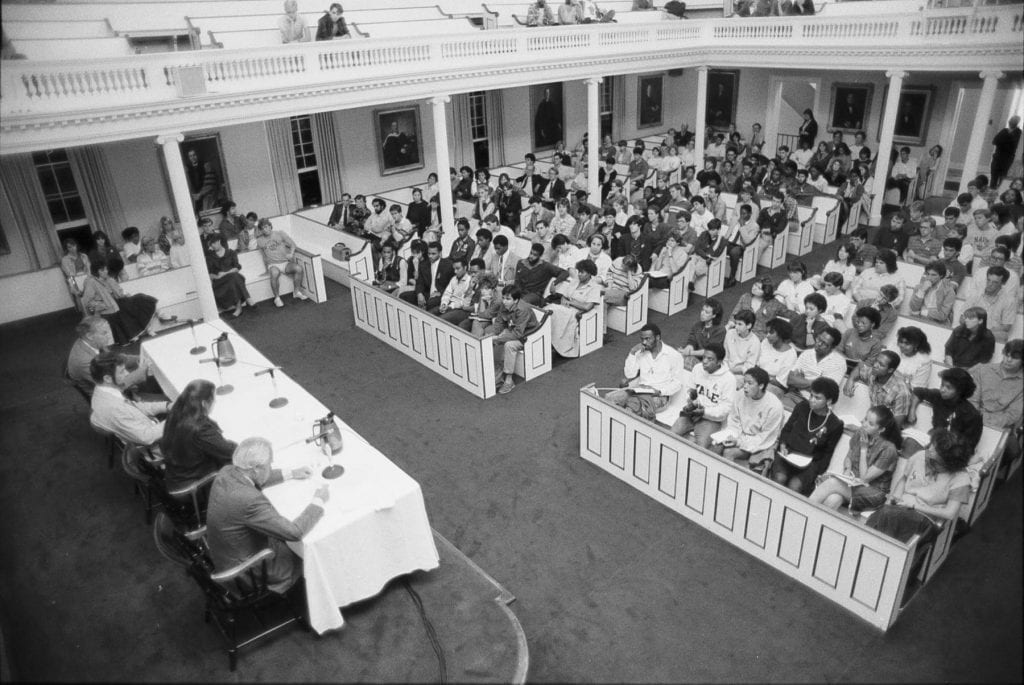 In honor of the upcoming Global Divestment Day urging institutions to divest from fossil fuel companies and the work being done on the Amherst Campus in support of divestment from coal, I thought we should take a moment to look back at an earlier time that Amherst divested its investment holdings on ethical grounds. I’m referring, of course, to the international campaign to pressure the South African government to dismantle its apartheid system in the 1970s and 80s (although Amherst also divested from Sudan in 2006 on ethical grounds).
In honor of the upcoming Global Divestment Day urging institutions to divest from fossil fuel companies and the work being done on the Amherst Campus in support of divestment from coal, I thought we should take a moment to look back at an earlier time that Amherst divested its investment holdings on ethical grounds. I’m referring, of course, to the international campaign to pressure the South African government to dismantle its apartheid system in the 1970s and 80s (although Amherst also divested from Sudan in 2006 on ethical grounds).

The first official action on South Africa by the trustees was at their fall 1977 meeting. Following some years of talks, debates and student organizing, a petition was presented to the Trustees at this meeting demanding that the college seek “corporate withdrawal from South Africa.” During the meeting around 70 students picketed Alumni House, while two spokesmen were invited to speak at the meeting.
During the meeting, the Trustees adopted a “Trustee Statement Concerning Investment in South Africa,” which referenced the ethical investment policy adopted by the college in 1972 and decided that the college would not divest outright, but would use its shareholder power to attempt to change the practices of companies that operated in South Africa. They were following what were known as the Sullivan principles.
Following a packed open meeting held by the Board of Trustees and the South African Support Committee in February, the Board again took up the question of divestment in their spring and fall 1978 meetings, affirming their previous decision both times. Divestment was one of the major topics on campus in the academic year of 1977/78, it was front page news in a quarter of Amherst Student issues and by November 1978, President Ward was able to state regarding the previous two years, “there has not been a meeting of the board in that time when the investment in corporations doing business in South Africa has not been a matter for discussion.”
Divestment remained a hotly debated, much committeed, and frequently demanded subject in the following years, throughout a great deal of turmoil and change at the college. In June 1985, following the lead of Reverend Leon Sullivan, President Pouncey and the Board of Trustees issued a statement that Amherst College would divest from South Africa if it had not made “significant progress toward eliminating statutory apartheid” within two years and instructed the College’s investment managers to prepare for such an eventuality.

Just four months later, in October of 1985, the Trustees made the unexpected decision to divest completely.
Ending apartheid in South Africa was a fraught and complicated topic, as President Ward said in a talk on divestment in Johnson Chapel in spring of 1978, it is not easy “for someone on either side to be confident about what actions one might take that would work toward betterment of the society.” Climate change and fossil fuel divestment are very different (some would say simpler) than the issues of institutionalized racial violence and inequality being addressed by the anti-apartheid movement, but we can hope for ongoing action and debate on campus that echos the passion, broad engagement, and thoughtful deliberation of this earlier era… and perhaps it will serve as inspiration the next time that Amherst has the opportunity to use its fiscal weight to leverage ethical change.
(For additional material on South African divestment at Amherst and much, much more, visit Archives and Special Collections for our upcoming “Race and Rebellion at Amherst College” exhibition planned for late February through June)










Thank you for this excellent reminder. I participated in the movement in 1984-85 while a freshman and sophomore at Amherst, even sitting in President Pouncey’s office to discuss it. It took a long time, but the trustees made the right decision ultimately — recognizing the role and weight of colleges in the public sphere. I hope our current trustees take note and move more aggressively that their recent letter on the topic would suggest.